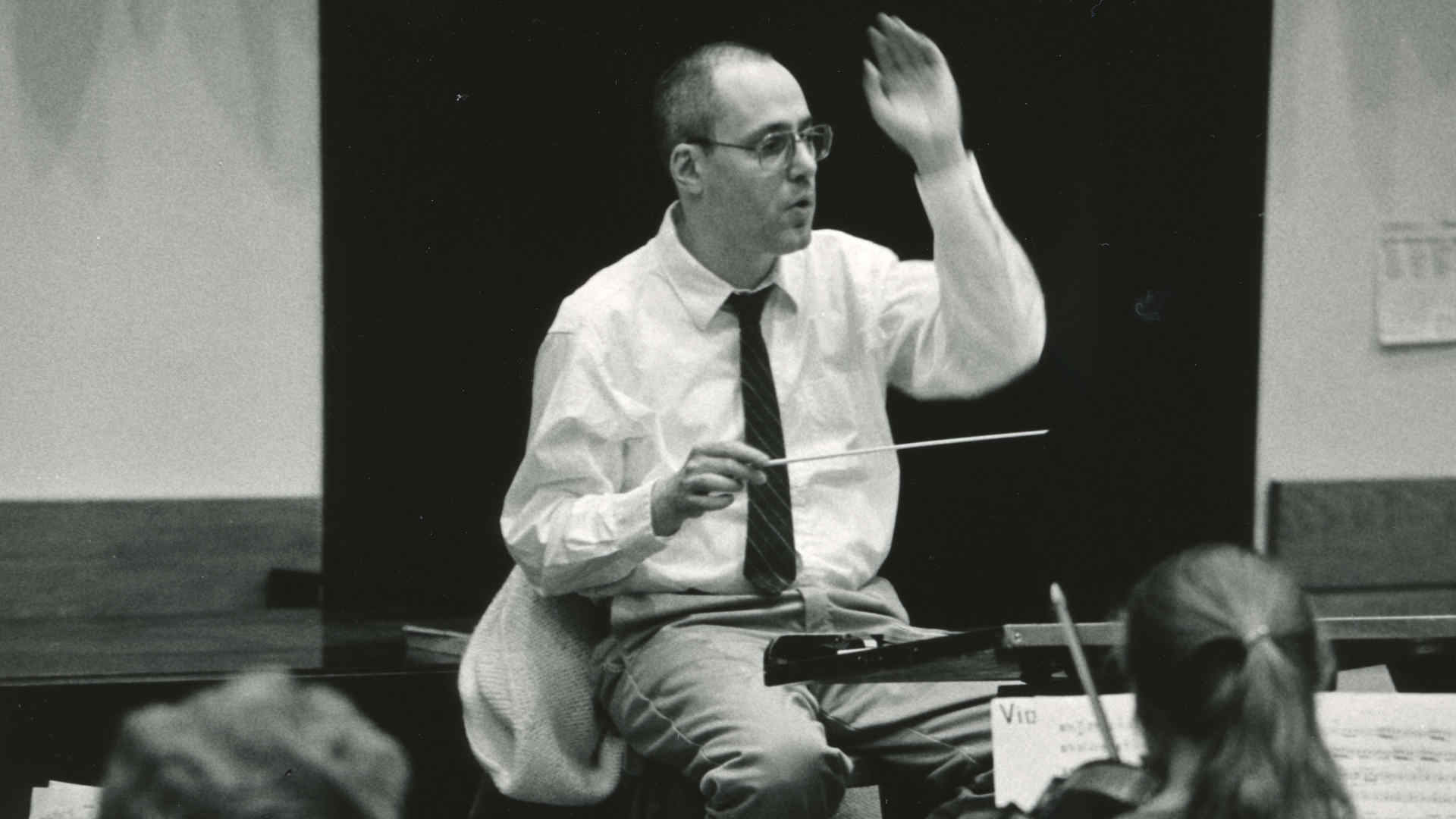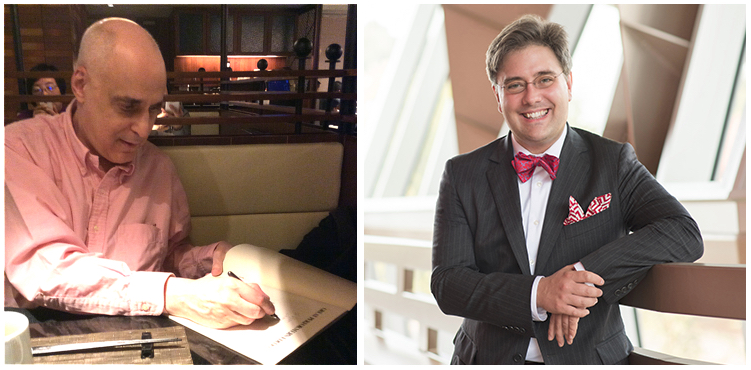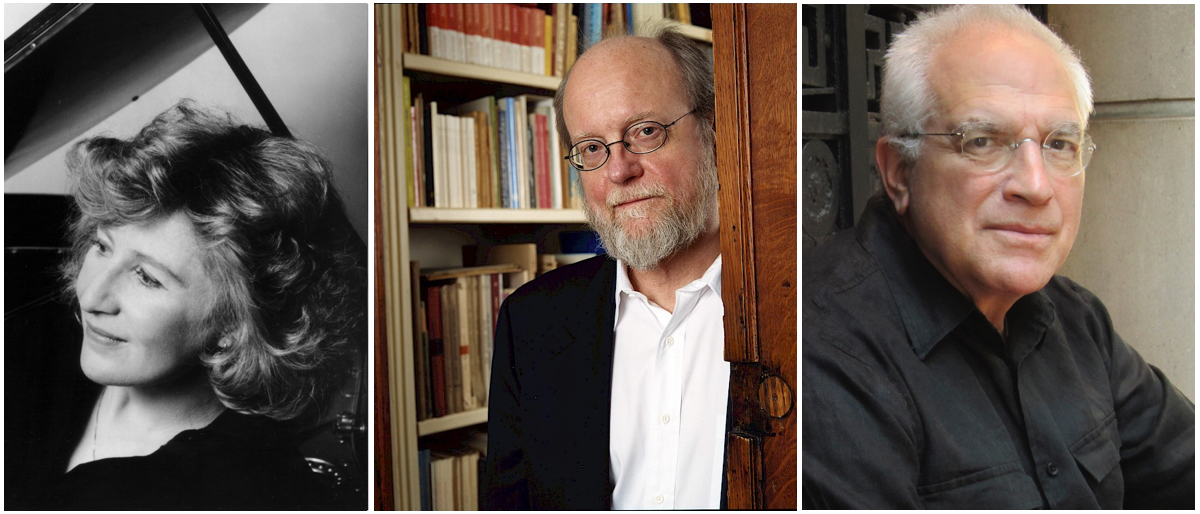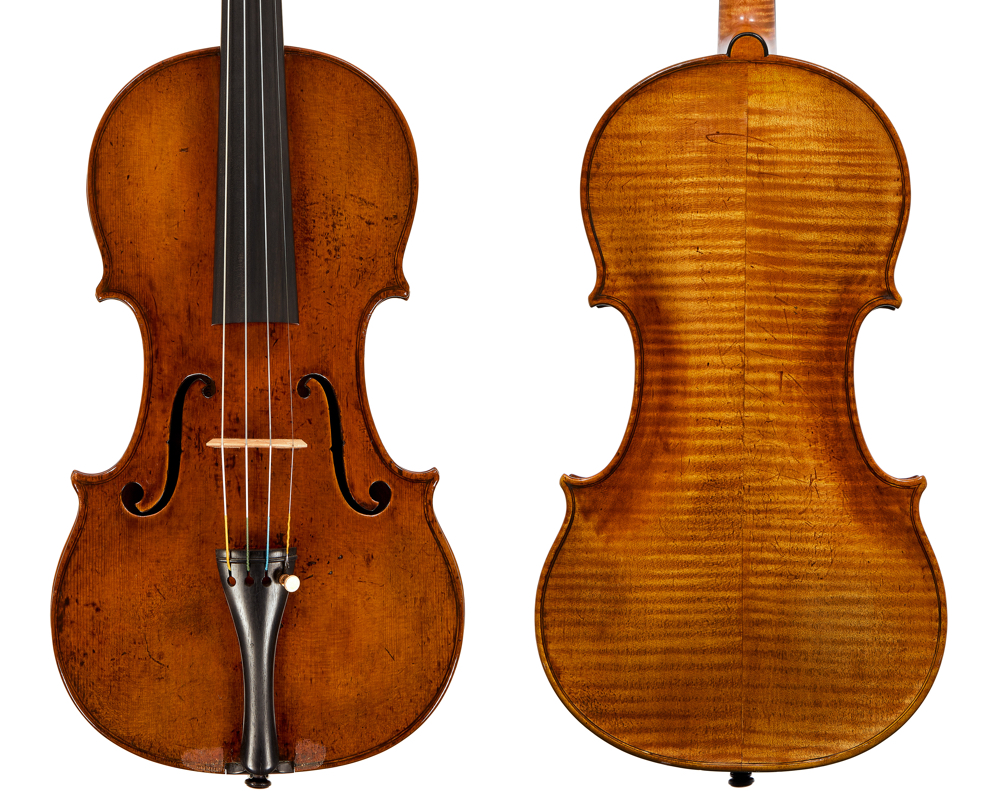I had known of Paul Zukofsky long before we met. His youthful photograph, touchingly dedicated to Ivan Galamian, hung on the ‘wall of immortals’ in Meadowmount’s dining room; its placement, within the orbit of photos of Rabin, Perlman and Zukerman, only augmented his perceived reputation.
When we finally did meet, years later, Paul was past middle age, stooped in posture and had a tendency to shuffle. The paleness of his complexion, along with his grey, closely-cropped hair and daily dress in a formless khaki suit and white shirt, gave him an almost conspicuous colorlessness. (Paul was delighted when I told him that Glenn Gould’s favorite color was battleship grey – ‘Mine too!’ he laughed!) But with Paul, all color and radiance came from his mind; the greatest I have ever known.

Paul Zukofsky in c. 1985 conducting the Juilliard Symphony
Milton Babbitt brought us together. Paul wished to record Babbitt’s Sixth Quartet for his label and I, freshly graduated from the Juilliard School, was eager for any project that might jumpstart my career. Coaching sessions were eventually followed by phone calls, and then dinners, out of which developed a deep friendship which, two years after his death, I remember and mourn with an aching sense of loss.
Paul was delighted when I told him that Glenn Gould’s favorite color was battleship grey – ‘Mine too!’ he laughed!
Our visits nearly always revolved around food. Most often Thai, but on especially memorable occasions, luncheon at La Côte Basque, that temple of cuisine, where Chef Rachou always paid a respectful visit to our table. He and Paul would banter in affable French, having excited discussions about which wines best paired with the cassoulet, and I would watch in ignorance and wonder.

Left: Paul Zukofsky, taken by Aaron Boyd (right) at their last meal together in 2015
Our meals lasted hours and were unforgettable masterclasses in music, culture and thought: phrase-lengths in Haydn minuets, prepausal and postpausal inflection in rhythmic figures, constructivist tendencies in Rachmaninoff’s Variations’…
Paul was a man of habit, and after dinner and Vietnamese coffee in Chinatown, we would usually, weather permitting, walk to Union Square, detouring along the way to a particular bank so that he could affectionately greet his favorite pair of stone guardian lions. For a man whose prickliness and abhorrence of sentiment could sting rudely, Paul was capable of moments of surprising tenderness, often remarking that I could be the younger brother, or son, he never had. One evening, as I was saying goodnight, Paul looked at me and said, ‘I love you.’ I was so stunned by his vulnerability at that moment that, to my continued regret, I pretended to not hear him.
Paul Zukofsky was a colossal talent and one of the greatest violinists of the second half of the 20th century. His recordings of Schnabel, Cage, Ives, Busoni, Paganini and Bach (all on his beloved Serafin violin) are testament to the profound breadth and depth of his art. In his death the world lost an intellectual giant and a musician of genius. I, a friend.
Paul – I love you too.
Aaron Boyd, award-winning violinist and Director of Chamber Music at the Meadows School of the Arts, Southern Methodist University.
Ursula Oppens
Paul understood music more fundamentally than almost anyone else I know. I first met him in theory class when we were at Juilliard Pre-College, but we didn’t really become friends until later on. We were both only children and Paul sometimes referred to me as his little sister.
We played many performances of the Elliot Carter Duo for Violin and Piano together. He taught me a great deal about how to play the music of Carter. Usually in chamber music, you try to stay together but in the Duo we have independent lines and it’s more important that your line makes sense as itself. I credit Paul greatly for teaching me that.
I also played the Brahms Second Piano Concerto with Paul conducting. As a conductor he was very gentle. He really wasn’t as difficult as his reputation portrays. If someone was trying to learn and was eager, he was quite good with them.
Ursula Oppens, Grammy Award nominated concert pianist.

From left to right: Zukofsky’s friends and colleagues Ursula Oppens, Charles Wuorinen and Fred Sherry
Charles Wuorinen
We played many concerts together and were on faculty at New England Conservatory. Paul wasn’t the easiest guy to get along with, so there were occasional moments of friction. He was a splendid musician, a very fine violinist, and when he decided to conduct he also did that very well. His musical accomplishments were substantial and need be remembered appropriately.
Charles Wuorinen, Pulitzer Prize-winning composer.
Fred Sherry
Paul Zukofsky was one of the greatest violinists I ever heard. When he drew the bow over the strings of his Serafin violin there was magic in the tone; often the tone was not sweet and legato but ranged from soft and mysterious to bold and powerful, and the elements of rhythm were always perfect.
Paul’s conducting was informed by careful study of the score and his remarkable ear. I remember a rehearsal of Milton Babbitt’s Relata at the Juilliard School when he demanded the concertmaster’s violin in order to demonstrate a tricky passage. The whole orchestra was awestruck. His personality was like his playing; it had a wide range. He could be funny, sharp-edged, kind or dismissive, but always provocative.
Fred Sherry, Grammy Award nominated cellist and Juilliard faculty member.
Tarisio sold Paul Zukovsky’s 1735 Santo Serafin violin in our May New York auction.
